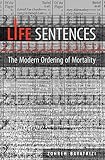Life Sentences : The Modern Ordering of Mortality / Zohreh Bayatrizi.
Material type: TextPublisher: Toronto : University of Toronto Press, [2008]Copyright date: ©2008Description: 1 online resource (208 p.)Content type:
TextPublisher: Toronto : University of Toronto Press, [2008]Copyright date: ©2008Description: 1 online resource (208 p.)Content type: - 9780802097552
- 9781442688490
- 306.9
- HQ1073 .B394 2008eb
- online - DeGruyter
| Item type | Current library | Call number | URL | Status | Notes | Barcode | |
|---|---|---|---|---|---|---|---|
 eBook
eBook
|
Biblioteca "Angelicum" Pont. Univ. S.Tommaso d'Aquino Nuvola online | online - DeGruyter (Browse shelf(Opens below)) | Online access | Not for loan (Accesso limitato) | Accesso per gli utenti autorizzati / Access for authorized users | (dgr)9781442688490 |
Browsing Biblioteca "Angelicum" Pont. Univ. S.Tommaso d'Aquino shelves, Shelving location: Nuvola online Close shelf browser (Hides shelf browser)

|

|

|

|

|

|

|
||
| online - DeGruyter Law of the Land : The Advent of the Torrens System in Canada / | online - DeGruyter Law, Mystery, and the Humanities : Collected Essays / | online - DeGruyter Liberalism and Hegemony : Debating the Canadian Liberal Revolution / | online - DeGruyter Life Sentences : The Modern Ordering of Mortality / | online - DeGruyter Living Masks : The Achievement of Pirandello / | online - DeGruyter Lonergan on Philosophic Pluralism : The Polymorphism of Conciousness as the Key to Philosophy / | online - DeGruyter Love and Objectivity in Virtue Ethics : Aristotle, Lonergan, and Nussbaum on Emotions and Moral Insight / |
restricted access online access with authorization star
http://purl.org/coar/access_right/c_16ec
Death has popularly had the reputation of being the last of life's great mysteries, a subject of speculation, and as a foreboding event both inevitable, and feared. In Life Sentences, Zohreh Bayatrizi examines the many concerted attempts from the last 350 years to strip death of its mystery, and to order, manage, and transform it from an individualized and fatalistic event to a social phenomenon that allows intervention. She examines the process that has caused death to be understood in five quasi-biblical commandments: "thou shalt not die violently; thou shalt not die prematurely; thou shalt not kill thyself; and thou shalt not die an undignified death, so that thou shalt die an orderly death." Beginning with John Graunt's Natural and Political Observations Made upon the Bills of Mortality (1662) - considered the first book of statistics - and philosopher Thomas Hobbes's declaration that society must minimize the "greatest evil" of unsanctioned violent deaths, Bayatrizi traces the pivotal moments that have changed our understanding of death. While illuminating the history of our increasingly rationalized understanding of death, she also examines some of our most contradictory reactions to controversial topics such as suicide, euthanasia, suicide bombing, "collateral damage," and how our moral values have been shaped by an understanding of the proper place of a well-ordered death in modern society. Both historically rigorous and vigorously engaged in contemporary debates, Life Sentences will be of interest to anyone interested in how we deal with death before we die.
Mode of access: Internet via World Wide Web.
In English.
Description based on online resource; title from PDF title page (publisher's Web site, viewed 01. Nov 2023)


